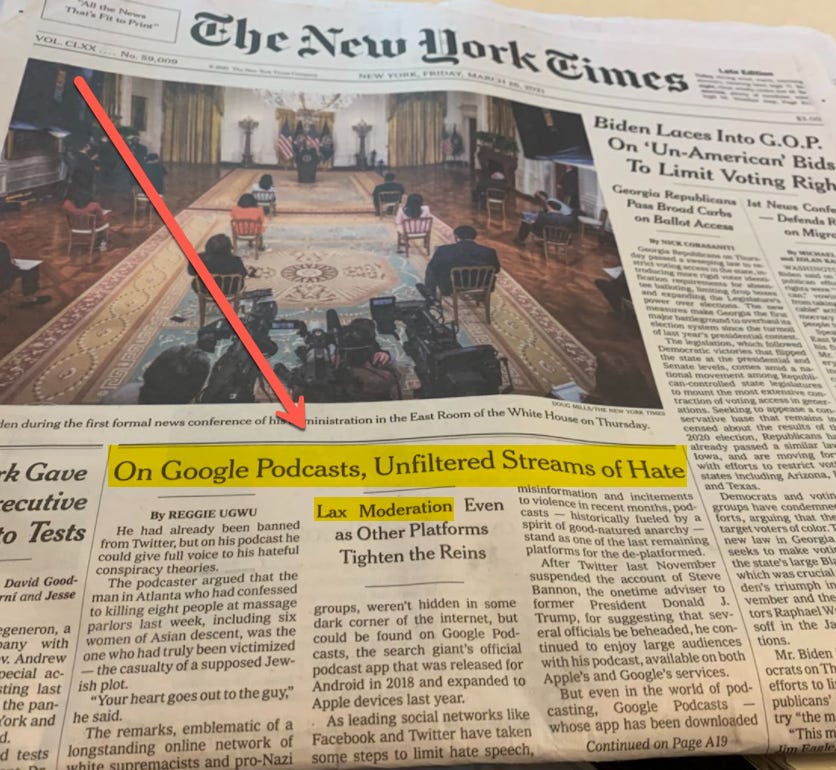Four snippets over the past few days (several of the articles are months old, though) from people who were taking no guff.
From New York Magazine last November, on turmoil at the New York Times:
Twitter presented innumerable headaches, with reporters having to be chastised for being overtly political, or simply for sounding un-Timesian in their pursuit of likes and retweets. “There’s a very sad need for validation,” one Times journalist who has tweeted tens of thousands of times told me.
Some of the trickiest jounalistic questions have centered on what the Times is or isn’t willing to say. After [James] Bennet’s ouster, [A.G.] Sulzberger met with a columnist for the “Opinion” section who had expressed consternation about the decision. Sulzberger promised the columnist that the Times would not shy away from publishing pieces to which the Times’ core audience might object. “We haven’t lost our nerve,” Sulzberger said.
“Yes, you have,” the columnist told Sulzberger. “You lost your nerve in the most explicit way I’ve ever seen anyone lose their nerve. You can say people are still gonna be able to do controversial work, but I’m not gonna be the first to try. You don’t know what you’ll be able to do, because you are not in charge of this publication — Twitter is. As long as Twitter is editing this bitch, you cannot promise me anything.”
Reeves Wiedeman, Inside the New York Times’ Heated Reckoning With Itself
I had forgotten this prophesy:
Let us not hedge about one thing. Donald Trump may win or lose, but he will never concede. Not under any circumstance. Not during the Interregnum and not afterward. If compelled in the end to vacate his office, Trump will insist from exile, as long as he draws breath, that the contest was rigged.
Trump’s invincible commitment to this stance will be the most important fact about the coming Interregnum. It will deform the proceedings from beginning to end. We have not experienced anything like it before.
Maybe you hesitate. Is it a fact that if Trump loses, he will reject defeat, come what may? Do we know that? Technically, you feel obliged to point out, the proposition is framed in the future conditional, and prophecy is no man’s gift, and so forth. With all due respect, that is pettifoggery. We know this man. We cannot afford to pretend.
Barton Gellman, What if Trump Refuses to Concede?, September 23, 2020.
Successful Substack writers continues to evoke envy, which tends to get expressed (in writing inferior to the Substack average) as addlepated moral outrage. Marxist blogger-turned-Substacker Freddie de Boer has had lots of thoughts about that, culminating most recently in this:
I write tens of thousands of words on topics ranging from why everyone is actually exhausted to The Giving Tree to the Nation of Islam to Instagram feminism to the charter school scam to atheism after the New Atheists (coming Monday!). Don’t like it? Write better shit, man. Or get mad online. It’s up to you. My people will support me, and I earned that.
What are you, 12? There’s no “deserves”
I hadn’t thought about the implications of some prominent Federalist Society members being implicated in the January 6 insurrection. But David Lat had thought about it quite a lot in the two weeks after:
The Federalist Society is a nonpartisan organization that does not — and cannot, as a 501(c)(3) nonprofit — endorse candidates for elective public office. It therefore has no official relationship with Donald Trump …
…
Unfortunately — and quite reprehensibly — several prominent FedSoc figures played roles in Trump’s baseless challenge to the 2020 election results, and therefore bear significant blame for the Capitol attack. Law professor John Eastman — chair of FedSoc’s Federalism and Separation of Powers practice group, and a frequent participant in Society events over the years — represented Trump in his (meritless and unsuccessful) attempt to get the Supreme Court to intervene in the election, urged Vice President Mike Pence to overturn the election results, and had a prominent speaking role at the rally that was the precursor to the riots. Senator Josh Hawley (R-Mo.) and Senator Ted Cruz (R-Tex.), two members of what conservative law professor John O. McGinnis once dubbed “the Federalist Society caucus” … led the charge in the Senate against certification of the election results, just hours after the horrific Capitol attack. In light of all this, a reckoning at the Federalist Society is in order.
…
So what should FedSoc do in the wake of the Capitol riots? …
First, and most obviously, the Society should no longer allow John Eastman, a prominent promoter of poisonous conspiracy theories about the election, to remain in leadership, as chair of the Federalism and Separation of Powers practice group …
Second, the Society should no longer host events with Eastman, Hawley, and Cruz …
Third, as a more general matter, the Federalist Society should try harder to steer clear of partisan politics. It should be non-partisan not just in name, but in spirit.
…
Of course, the larger and longer-term issue, not just for the Federalist Society but for conservatives, libertarians, and Republicans, is how much of their principles they are willing to sacrifice for power. Allying themselves with Donald Trump for four years got them tax reform, three Supreme Court seats, more than 200 lower-court judgeships, and all sorts of other goodies. But was it worth it?
… I am the last person to underestimate the importance of judges, but if you will allow me to close by paraphrasing Meatloaf, here is my bottom line:
“I would do anything for judges — but I won’t do that.”
David Lat, The Federalist Society And The Capitol Attack: What Is To Be Done?
You can read most of my more impromptu stuff at here. It should work in your RSS aggregator, like Feedly, should you want to make a habit of it.
